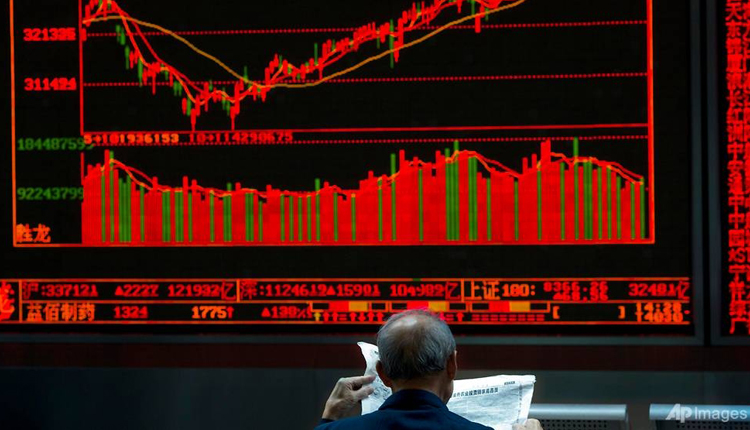Asian markets were lower on Tuesday, a day after Beijing raised tariffs on some American goods in retaliation for Washington’s decision last week to increase duties on Chinese products.
Mainland Chinese shares slipped on the day, with the Shanghai composite lower by 0.69% to about 2,883.61 and the Shenzhen component down 0.71% to 9,038.36. The Shenzhen composite declined 0.624% to approximately 1,542.07.
Hong Kong’s Hang Seng index fell around 1.7%, as of its final hour of trading, with shares of Chinese tech giant Tencent dropping more than 2.5%.
The Nikkei 225 in Japan fell 0.59% to close at 21,067.23, with shares of index heavyweight and conglomerate Softbank Group plunging 5.44%. The Topix index also slipped 0.4%.
In South Korea, the Kospi bucked the overall trend as it rose 0.14% to close at 2,081.84 as shares of chipmaker SK Hynix jumped 1.5%.
Australia’s ASX 200 slipped 0.92% to close at 6,239.90 as most sectors declined.
“My view to investors basically is to say: ‘You have no edge, you have no understanding, you really don’t know what’s going to happen. You can try to trade it but really you’re trading blind,’” Viktor Shvets, head of Asian strategy at Macquarie Commodities and Global Markets, told CNBC’s “Capital Connection” on Tuesday.
China announced Monday that it will raise tariffs on $60 billion worth of U.S. goods, beginning on June 1. The goods targeted include a broad range of agricultural products. Last week, U.S. President Donald Trump raised duties on $200 billion in Chinese goods to 25% from 10%.
At a White House event Monday evening, Trump gave an estimate of when a breakthrough in negotiations with China could be announced.
“We’ll let you know in three or four weeks if it’s successful,” he said, according to NBC News.
Prior to the recent escalation in tensions, markets had largely anticipated the two economic powerhouses to be close to reaching a deal that would end their protracted trade fight.
“We believe the talks broke down due largely to what we perceive as irreconcilable differences between US security concerns about China’s industrial policy and China’s dedication to these policies as means to avoid the ‘middle income trap’,” analysts at Barclays wrote in a note.
“In our new baseline scenario, we assume that the US places tariffs on most, if not all, imports from China over time and China responds with measures of its own, though not in proportion. We estimate direct net economic losses to the US at 0.2-0.3% of GDP over the long run,” the analysts said, adding, “Indirect effects from a loss in business or consumer confidence, or from an escalation in financial market volatility, could easily lead to larger declines in output and employment.”
Treasury Secretary Steven Mnuchin told CNBC the two countries are “still in negotiations.” Trump also said the U.S. is in a “great position,” noting that “our economy has been very powerful; theirs has not been.”
Tuesday’s session in Asia followed overnight declines on Wall Street.
The Dow Jones Industrial Average plunged 617.38 points, or 2.4%, to close at 25,324.99 and posted its worst session since Jan. 3. The S&P 500 also had its worst day since early January, falling 2.4% to 2,811.87. The Nasdaq Composite dropped 3.4% — its biggest one-day loss of the year — to close at 7,647.02.
The U.S. dollar index, which tracks the greenback against a basket of its peers, traded at 97.367 after dropping to levels below 97.2 yesterday.
The Japanese yen, widely viewed as a safe-haven currency, traded at 109.67 against the dollar after touching an earlier high of 109.13. The Australian dollar changed hands at $0.6951 after slipping from levels above $0.696 yesterday.
Oil prices rose in the afternoon of Asian trading hours, with the international benchmark Brent crude futures contract gaining 0.23% to $70.39 per barrel. U.S. crude futures advanced fractionally to $61.08 per barrel.
Source: Reuters


